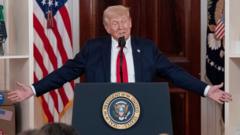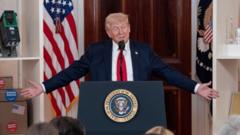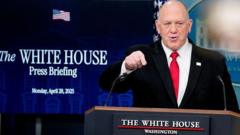President Trump's directive for new tariffs targets numerous countries, including India and the EU, as part of a strategy aimed at boosting U.S. manufacturing. Critics warn this could escalate global trade conflicts.
President Trump Unveils New Reciprocal Tariffs, Intensifying Global Trade Tensions

President Trump Unveils New Reciprocal Tariffs, Intensifying Global Trade Tensions
The recent announcement of reciprocal tariffs by President Trump is poised to impact international relations and trade dynamics significantly.
President Trump has taken a bold step in the realm of international trade by ordering his advisers to prepare for new "reciprocal" tariffs that are expected to affect nearly all countries worldwide. With the implementation date projected for around April 2, the new tariffs are designed to reflect the existing tariffs, taxes, and subsidies imposed by other nations on U.S. goods. This move has sparked concerns about exacerbating strained relations with foreign governments, particularly affecting key partners like India, Japan, and the European Union.
At an announcement held in the Oval Office, Trump asserted his objective of incentivizing companies to bring their manufacturing operations back to American soil, stating, “If you build here, you’ll have no tariffs whatsoever.” His subsequent meeting with India’s Prime Minister Narendra Modi showcased a dual approach, where the administration noted potential multi-billion dollar military sales to India while also emphasizing collaborations in advanced technological fields such as semiconductors and artificial intelligence.
This shift marks a stark departure from decades of tariff negotiations governed by international bodies like the World Trade Organization (WTO). Trump's imposition of tariffs could be viewed as a dismantling of the established global trade framework, aligning with growing protectionist sentiments within the U.S. Critics, including trade policy experts, have expressed deep concern regarding this strategic pivot. Eswar Prasad from Cornell University remarked, “These tariff proposals amount to a declaration of an all-out trade war against practically all major U.S. trading partners,” describing the decision as both “stunning and disappointing.”
As tensions rise between the U.S. and its trading partners, Trump's administration continues to assert its influence across various sectors, from the arts to education. The landscape of global trade may face significant upheaval, raising questions about the long-term consequences of Trump's unilateral approach as he seeks to redefine the principles underlying international commerce.





















